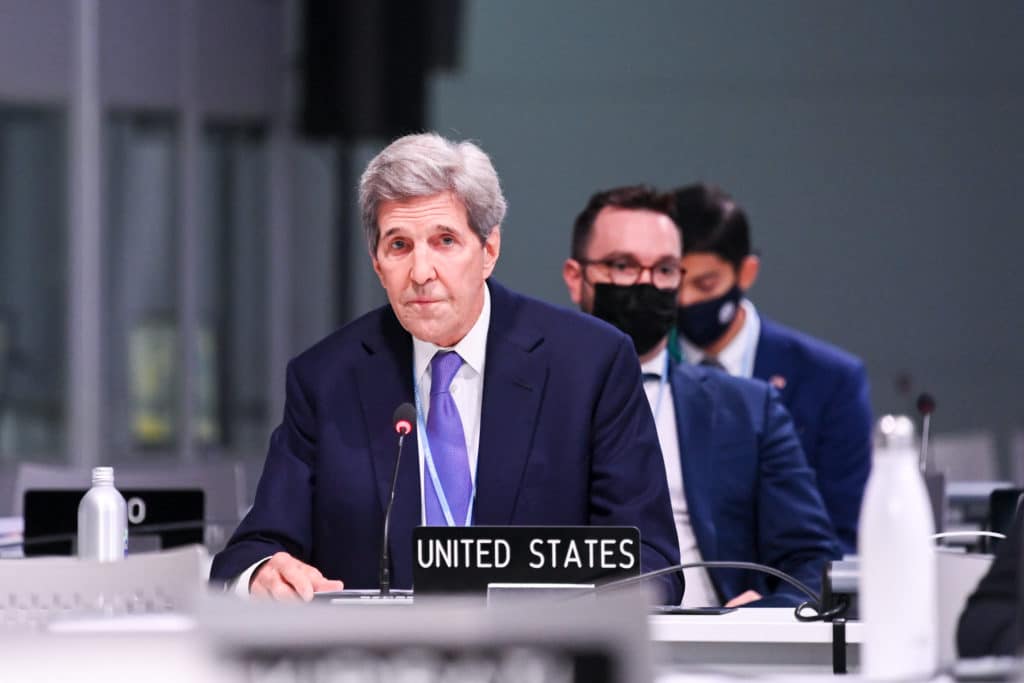The announcement seeks to boost renewable projects in developing countries. However, critics say Kerry’s carbon trading scheme will not reduce greenhouse gas emissions.
—
On Wednesday, White House climate envoy John F. Kerry outlined its carbon trading scheme in Sharm El Sheik, Egypt, saying the plan would be “critical” in helping developing nations transition to cleaner energy sources. The announcement came on the fourth day of climate negotiations at COP27, the year’s most important climate change conference.
The new voluntary scheme – dubbed the “Energy Transition Accelerator” – seeks to expand the sale of carbon credits with the goal of boosting renewable projects in developing countries. It would allow companies to claim carbon credits for investing in clean energy and decarbonisation projects across the developing world. The credits are tied to decarbonisation projects and will not be open to fossil fuel companies.
Kerry argues that no developing nation can afford to pay for the clean transition – which requires annual investments to triple to more than $4 trillion by 2030, according to the International Energy Agency (IEA) – and only a flood or private finance can do the job.
“Wealthy countries are stepping up their support — but still not enough. Our administration is working as hard as we can to deliver,” Kerry said in announcing the program. “I hope today is the beginning of doing that, to deliver real and lasting benefits for developing countries and the climate.”
High-profile supporters of the carbon trading scheme include the State Department along with the Rockefeller Foundation, Bezos Earth Fund, as well as giants such as PepsiCo and Microsoft. Nigeria and Chile also expressed their interest in backing the plan. They committed to supporting further negotiations on the carbon trading plan, arguing that it may be the most effective way to finance clean energy projects and shut down coal plants in the absence of global cooperation.
Environmental groups and experts in carbon markets pushed back against Kerry’s plan, warning that it would allow corporate money to finance green projects that were going to happen anyway and is thus be very unlikely to cut greenhouse gas emissions – Bloomberg reports.
You might also like: Is Carbon Offset a Form of Greenwashing?
Voluntary offset programmes are gaining popularity despite mounting scepticism over whether they’re effective in reducing emissions. In his announcement speech on Wednesday, however, the US envoy said better safeguards to ensure that carbon credits support a just energy transition while avoiding new fossil fuel projects – and whose environmental progress can be verified, would make his plan better than all past efforts.
Many opposers also argue that the US should focus on cutting emissions within the country before paying for emission reductions across the Global South.
“What we need is robust rules around emissions cuts and a comprehensive climate finance system that forces rich countries to deliver what they’ve promised, not try to find finance down the back of the sofa at the backwaters of the private sector,” said Mohamed Adow, director of the think tank Powershift Africa. “Private sector finance should be separate from the country’s obligations under the [United Nations Framework Convention on Climate Change].”
The announcement came a day after the UN released a report warning that businesses’ net-zero commitments focusing on offsets may allow them to avoid curbing their own carbon output.
“The absence of standards, regulations and rigor in voluntary carbon markets is deeply concerning,” U.N. Secretary General António Guterres said Tuesday. “Targets must be reached through real emissions cuts.”
Since day one of the conference, developing countries have been calling out wealthy nations for not helping to rescue them from the devastating impacts that global warming is having on them, despite their almost insignificant contribution to global carbon emissions.
Featured image by Karwai Tang/UK Government (Flickr)
You might also like: COP27 Countries Launch Partnership to Track Progress On Glasgow Deforestation Pledge


















